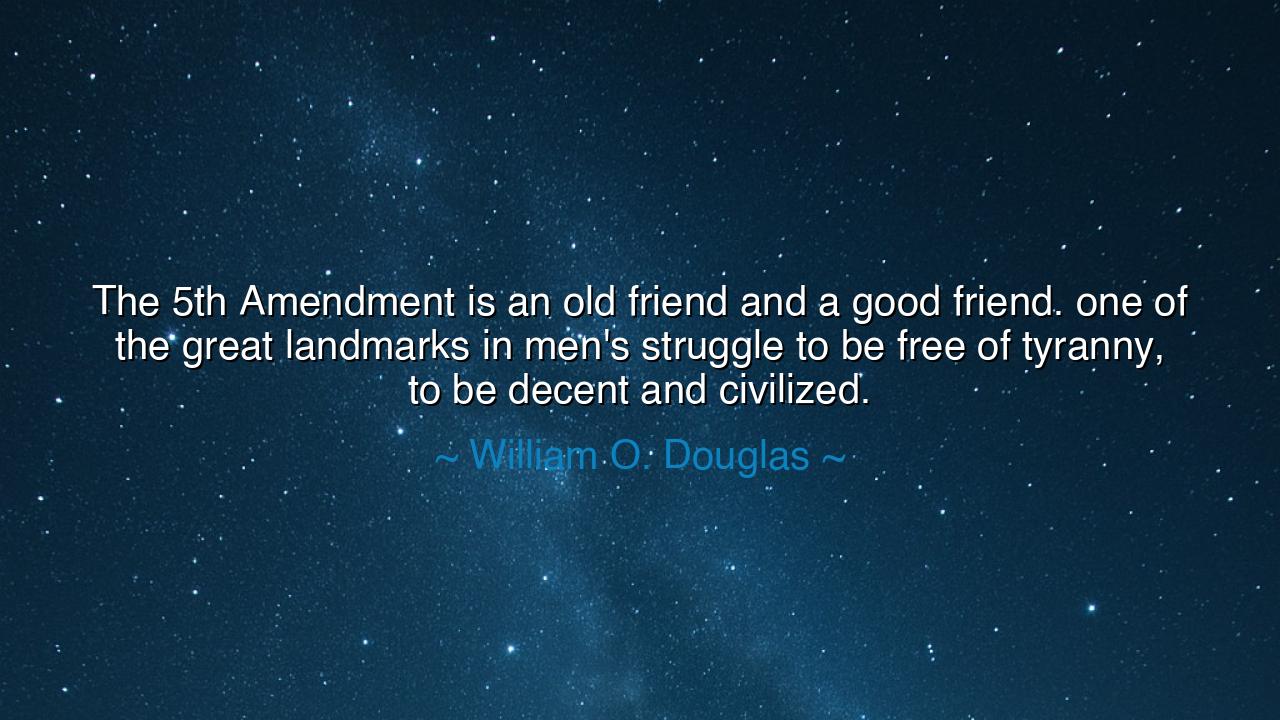
The 5th Amendment is an old friend and a good friend. one of the
The 5th Amendment is an old friend and a good friend. one of the great landmarks in men's struggle to be free of tyranny, to be decent and civilized.






Hear, O guardians of liberty and seekers of justice, the words of William O. Douglas, a voice of conscience from the Supreme Court of the United States, who said: “The 5th Amendment is an old friend and a good friend. One of the great landmarks in men’s struggle to be free of tyranny, to be decent and civilized.” These words are not merely the reflection of a jurist—they are a hymn to freedom itself, a reminder that civilization is upheld not by power, but by the restraint of power; not by punishment, but by principle.
The Fifth Amendment, born of the American Revolution, stands among the sacred guardians of liberty. It proclaims that no man shall be compelled to be a witness against himself, nor be deprived of life, liberty, or property without due process of law. It arose from the ancient struggles of mankind—when kings and inquisitors sought to crush the soul through forced confession, when men were tortured to speak against themselves, and justice was bent to the will of tyranny. The Fifth Amendment was America’s answer to centuries of despotism: a shield of silence, dignity, and human worth.
When Douglas called it “an old friend,” he spoke as one who had seen the storms of history. To him, the Amendment was not a mere legal phrase, but a living companion of freedom—a friend that stood beside men in their darkest hours, reminding them that even in accusation, they retained their humanity. It is a friend that whispers to both the powerful and the powerless: “You are not to be broken by fear or force. Your rights are not the gifts of rulers—they are your birthright as a human being.”
Consider the story of Sir Thomas More, who in the reign of Henry VIII refused to speak the words that would condemn his conscience. Though the Fifth Amendment did not yet exist, his silence was its spiritual ancestor. When pressed to betray his faith, he replied only, “I do no harm, I say none.” For that silence he was condemned to death. Yet his courage lived on through the centuries, until the world learned to protect such silence as sacred. The Fifth Amendment enshrined what men like More had died for: the right to conscience, the right to withhold speech when speech would destroy the soul.
William O. Douglas, through his years upon the high court, understood that every society must choose between tyranny and restraint. Tyranny demands confession; restraint honors silence. Tyranny assumes guilt; restraint demands proof. Civilization itself, he taught, depends upon the balance between justice and mercy, power and humility. Thus, the Fifth Amendment is not merely a clause of law—it is the heartbeat of civilization, a constant reminder that decency requires limits upon the reach of authority.
Yet the beauty of Douglas’s words also lies in his recognition that the Amendment is not a shield for criminals alone—it is a safeguard for the innocent. For when fear reigns, even the blameless may be destroyed by the machinery of accusation. The Fifth Amendment stands so that the state may never consume the individual, and that the voice of conscience may never be drowned by the roar of coercion. It ensures that justice remains a dialogue, not a command—a system where even the accused retains dignity before the law.
Let the people, then, cherish this “old friend.” For every generation must defend what it has inherited from the last. Freedom is not self-sustaining; it must be guarded by those who understand its cost. Teach your children that silence can be noble, that rights once surrendered are not easily regained, and that civilization endures only where law protects the weak from the strong. When the winds of fear rise again—as they always do—remember Douglas’s words, and hold fast to this friend, this landmark, this shield of justice.
Thus the teaching stands eternal: the Fifth Amendment is not merely law—it is memory and morality intertwined, proof that mankind has learned, through blood and struggle, that to be decent and civilized is to protect the dignity of every soul. And as long as this friend endures, tyranny shall tremble, and liberty shall live.






AAdministratorAdministrator
Welcome, honored guests. Please leave a comment, we will respond soon